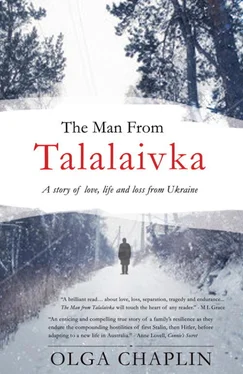Evdokia sighed. The commandant of Federwader camp had been right, in that regard. This camp was so close to Wilhelmshaven that just one well-placed, if misdirected, bomb would wipe out its dormitories, its hidden fire engines, and its small underground munitions factory. This reality numbed her, each waking moment of every passing day in the camp, consumed any creative energy, or joy, that she had hoped would return, with the birth of her child.
* * *
The November dawn was crisp, its black-grey cloak seeming to protect her as she and the children walked the short distance to the crèche building. She stoked the iron stove’s ash, prepared the twigs for the morning’s cooking, checked the chimney’s funnel that ran alongside the building to an underground dispersion point. Within minutes the small building, within sight of the dormitories and of the metal door leading to the underground munitions workshop, came alive with the warmth of the fire and smell of Evdokia’s platske as the other women brought their children and hurried to the workshop. Evdokia counted the dozen or so children as she prepared their early morning meal. By now she knew each child well and watched with satisfaction as they sat at the table: some, like Mykola, so hungry, other infants, playful with their platske and chattering.
She looked up as the door opened. A boy-soldier stumbled in with a large bucket of chopped wood.
“Guten Morgen, Karl. Danke schon,” she nodded to him and removed several logs as he staggered to the stove. The young soldier tipped his hat, more to steady it, nodded silently. His eyes flicked across the room, observing this scene of apparent normality, paused as he noticed the pram in a corner. He lowered the bucket near the stove and stacked the wood to pyramid perfection and stood back, still eyeing the pram, then tiptoed closer and gazed at the sleeping baby. He seemed puzzled and shook his head, then, noticing Evdokia observing him, he blushed. She could not surmise what this young man was thinking: whether he was in awe of such a young infant in this makeshift camp, or curious of its ancestry, its white hair and pale, almost translucent skin giving it a doll-like appearance. He shuffled his feet, appeared to clear his throat, pushed his oversized hat back as he made for the door.
She hesitated, distracted by the needs of the children. “Danke, Karl,” she nodded as she closed the door after him, felt emotions of empathy sweep through her as she tried to understand his situation.
“He is just fifteen, and is already in this army… yet he is only a little taller than my Mykola…” She looked across to Mykola. Her heart skipped a beat. “He is also trapped… not permitted to step outside this room all day…” Already he tried to fill his day: working out incomprehensible words in a German grammar book left mysteriously in this room weeks ago, playing games made up with other children, from new Ukrainian words she taught each day, and even attempting crude whittling of broken twigs with blunt utensils, to make figurines of make-believe horses and soldiers and aircraft, in games that kept the children amused for hours.
He had become her companion, her assistant, in these past three months. Though still a child, he was being forced too soon to become a man of ten tender years, with responsibilities placed on him by the war’s circumstances as Peter and the other men were pushed to greater and greater risks of exhausting fire brigade work. Her Mykola attended to the fire at the stove, even helped in preparing the evening meal in the large pots as the women returned at twilight to eat with their children before taking them back to their dormitory.
“It is just as well the commandant lets our men visit us here,” she thought, relieved at this concession by the soldiers. “He knows our men risk their lives for us as well… It gives us hope we could survive to the end of the war… God only knows when that will be.”
At last she made her mug of tea, poured in a few drops of milk she had saved from the platske mix, sat at her chair within sight of baby Ola’s face. Constantly tired, over-awed by the threatening air raids that, like clockwork, would begin again as soon as the fog cleared on the northern coastline, she allowed herself some contemplative moments, to try to regain her sense of balance in this unending way of life. She watched as Nadia and the other infants gazed over a child’s picture book someone had left on another night, watched as they interpreted the German fairytale, excitedly giving their version in hand gestures and explanations, acting out the roles of princes and princesses, and dancing to the final happy ending. She smiled, warmed by their spontaneity and innocence, in the midst of the inexplicable that surrounded them.
She closed her eyes for a few moments. “Thank you, God,” she prayed, in acknowledgement of her good fortune, thankful that Ola’s birth those three months ago had concluded well, despite the trauma of that day. She sighed, relieved, yet her emotions were mixed with sadness as she remembered her own fortuitous circumstance of giving birth to her child in a dark corridor of the hospital, within hours of arrival, as traumatised nurses ran to save the lives of yet more bomb victims rushed to the overcrowded hospital, which also was constantly under attack from the mighty bombs.
Evdokia turned again to observe her baby, and waited for her next waking time. She was grateful that here, at least, there seemed to be sufficient food for them to survive on, whatever came in the supply truck, and however sporadic its delivery.
* * *
Another mid-morning air raid on the northern port-side of the city had passed. Evdokia prepared the children for their rest. She spread the mats on the floor and allocated the children their rest corners. She had more kasha to prepare, cut the dark brown bread into small pieces to avoid wastage. The next onslaught would be upon them before the children were fully rested. She shuddered as she thought of this carpet-bombing strategy the Allied powers now used relentlessly in the hope that Hitler and his regime would sue for peace. She could not repeat to others the rumours Peter had heard whispered, for fear of reprisal, even at this extreme time of Germany’s shortage of workers: of the Hitler regime’s having just pulled together another half-million soldiers from its male workforce, to replace all those millions lost on the eastern and western fronts.
“And the Russian army gets closer and closer,” she murmured to herself. “Peter hears they are at Germany’s eastern border.” With Hitler’s satellite states in the east falling, one after another, as if in a badly-played child’s board game, some even suing for peace with the Allies, the atmosphere within the German army, including its High Command, was becoming desperate. Yet not only did the July attempt on Hitler’s life fail; somehow, it had reinvigorated the tyrant to try again, for ever more ambitious campaigns of assault.
Evdokia shook her head, could not contemplate what else this total war would lead to. Even though she had had little education, her own life’s experience told her that to be fighting an ever-stronger Soviet military machine on the one side, and ever-stronger united Allied forces on the other, could only lead to a disastrous conclusion for Germany and its people. Yet its leader refused to surrender. And so the bombs kept coming, the cities permanently damaged, scorched, even almost wiped out… and Hitler’s soldiers, and the overworked Albert Speer, had to devise ingenious ways of continuing production, such as this makeshift munitions workshop underground, which only housed a few dozen prisoner women in this temporary camp.
She bent down to the bucket that held the water for the lunchtime meal, paused for a moment. It was almost negligible, but she could hear the droning, yet it was not following its usual path. She straightened, metal mug in hand, trying to work out the drone’s direction. The hum seemed to be fading. She heaved a sigh of relief, bent again for the water. Then suddenly, the shuddering drone was above her. She gasped, ran to the door, could not see anyone running to warn her. The munitions workshop was buffeted by the many metres of walkway down a long-unused shaft, and the metal door, when shut, would not be opened from the outside. The other women would either be safe, in their natural bunker, or incinerated if the mine-shaft took a direct hit.
Читать дальше












